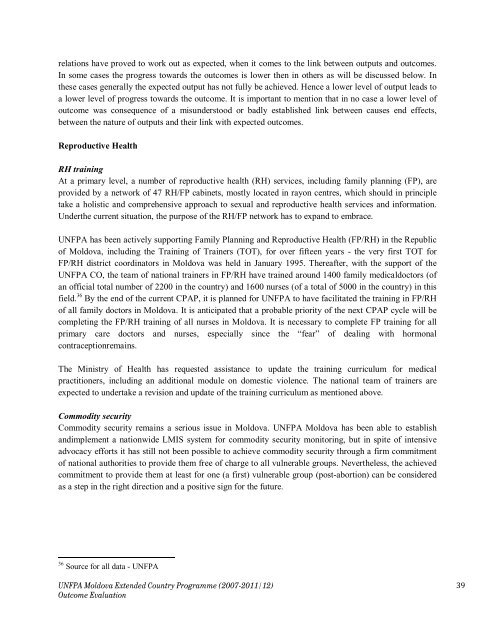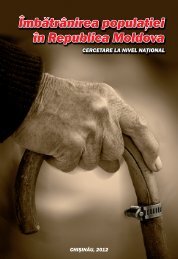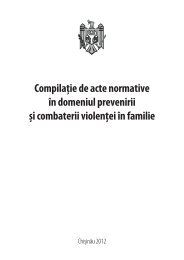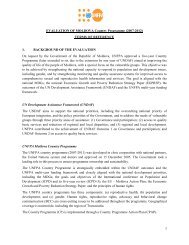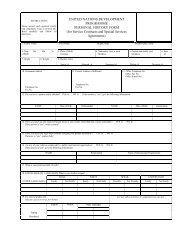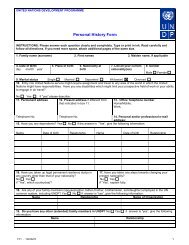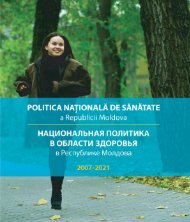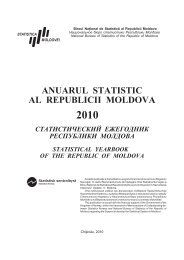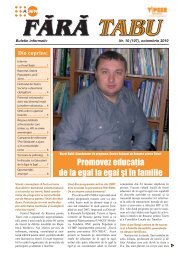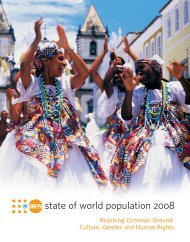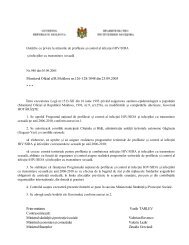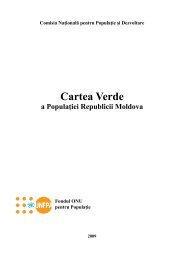Country Programme (2007-2011/2012) evaluation - UNFPA Moldova
Country Programme (2007-2011/2012) evaluation - UNFPA Moldova
Country Programme (2007-2011/2012) evaluation - UNFPA Moldova
Create successful ePaper yourself
Turn your PDF publications into a flip-book with our unique Google optimized e-Paper software.
elations have proved to work out as expected, when it comes to the link between outputs and outcomes.<br />
In some cases the progress towards the outcomes is lower then in others as will be discussed below. In<br />
these cases generally the expected output has not fully be achieved. Hence a lower level of output leads to<br />
a lower level of progress towards the outcome. It is important to mention that in no case a lower level of<br />
outcome was consequence of a misunderstood or badly established link between causes end effects,<br />
between the nature of outputs and their link with expected outcomes.<br />
Reproductive Health<br />
RH training<br />
At a primary level, a number of reproductive health (RH) services, including family planning (FP), are<br />
provided by a network of 47 RH/FP cabinets, mostly located in rayon centres, which should in principle<br />
take a holistic and comprehensive approach to sexual and reproductive health services and information.<br />
Underthe current situation, the purpose of the RH/FP network has to expand to embrace.<br />
<strong>UNFPA</strong> has been actively supporting Family Planning and Reproductive Health (FP/RH) in the Republic<br />
of <strong>Moldova</strong>, including the Training of Trainers (TOT), for over fifteen years - the very first TOT for<br />
FP/RH district coordinators in <strong>Moldova</strong> was held in January 1995. Thereafter, with the support of the<br />
<strong>UNFPA</strong> CO, the team of national trainers in FP/RH have trained around 1400 family medicaldoctors (of<br />
an official total number of 2200 in the country) and 1600 nurses (of a total of 5000 in the country) in this<br />
field. 36 By the end of the current CPAP, it is planned for <strong>UNFPA</strong> to have facilitated the training in FP/RH<br />
of all family doctors in <strong>Moldova</strong>. It is anticipated that a probable priority of the next CPAP cycle will be<br />
completing the FP/RH training of all nurses in <strong>Moldova</strong>. It is necessary to complete FP training for all<br />
primary care doctors and nurses, especially since the “fear” of dealing with hormonal<br />
contraceptionremains.<br />
The Ministry of Health has requested assistance to update the training curriculum for medical<br />
practitioners, including an additional module on domestic violence. The national team of trainers are<br />
expected to undertake a revision and update of the training curriculum as mentioned above.<br />
Commodity security<br />
Commodity security remains a serious issue in <strong>Moldova</strong>. <strong>UNFPA</strong> <strong>Moldova</strong> has been able to establish<br />
andimplement a nationwide LMIS system for commodity security monitoring, but in spite of intensive<br />
advocacy efforts it has still not been possible to achieve commodity security through a firm commitment<br />
of national authorities to provide them free of charge to all vulnerable groups. Nevertheless, the achieved<br />
commitment to provide them at least for one (a first) vulnerable group (post-abortion) can be considered<br />
as a step in the right direction and a positive sign for the future.<br />
36 Source for all data - <strong>UNFPA</strong><br />
<strong>UNFPA</strong> <strong>Moldova</strong> Extended <strong>Country</strong> <strong>Programme</strong> (<strong>2007</strong>-<strong>2011</strong>/12)<br />
Outcome Evaluation<br />
39


